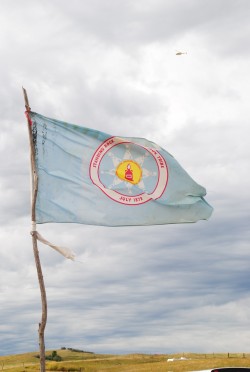News | October 25th, 2016

By C.S. Hagen
CANNONBALL – Highway 1806 is more than a road to Standing Rock activists.
The pitched hills dotted with wild sage, the roaming buffalo herds, the listless ponds hedged by crooked elms, are postcard perfect, revealing nothing of the racial hatred and violence the lands have seen in the past 200 years.
“1806 is more than the number of the highway,” Rissa Williams, an activist said. “It is the year of their mindset.”
Mindset of the Peace Garden State, Williams said.
She went to sleep in a yurt Saturday night, nervous. Woke up at 4:30 a.m. to a friend’s baby crying, nervous. Got dressed, had coffee, and geared up to face the inevitable arrival of militarized police. While heading to the front line, an eagle watched her from its nest.
“We prayed he’d watch over us,” Williams said. “We joked away our nerves, prayed and smudged, and waited. We joked about who could run the fastest. It was pretty clear that slow me would be an early arrest.”
If arrested, Williams could lose her part time job as a substitute teacher’s aide in Bismarck. She would see the sheriff’s deputy she knew from church if she was hauled to jail. How would she make bond? All these questions and more quickened her nerves. Police gathered to the west, and still she and nearly 600 others waited on lands the Lakota reclaimed under their own eminent domain laws Sunday morning.
The only way to find calm was to pray and dance, Williams said. “We danced and sang and prayed, summoning peace and courage to face whatever they had planned for us.”
A young man next to her saw her faltering.
“He looked me in the eyes and saw my fear and danced right behind me until I settled down. Then I saw him and others doing the same all throughout the circle. I’ve never felt anything like that young man holding and disposing my fear and sharing his courage until I could re-find my own.”
Until Tuesday evening, law enforcement has yet to move in on Standing Rock’s new camp. The Standing Rock Sioux Chairman Dave Archambault II has called upon the U.S. Department of Justice for an investigation.
"The DOJ should be enlisted and expected to investigate the overwhelming reports and videos demonstrating clear strong-arm tactics, abuses and unlawful arrests by law enforcement," Archambault said.
_and_best_friend_at_standing_rock_area_-_photo_provided_by_rissa_williams__250-wide.jpg)
As the Dakota Access nears the U.S. Army Corps of Engineers’ easement along the Missouri River, state law enforcement in the past two weeks have militarized, and cracked down, frequently beating activists to action sites. Excluding a walk-through along the pipeline by some of the parties concerned last week, dialogue from both sides is nearly non-existent.
After a request for information from Governor Jack Dalrymple’s office, the office said there has been no correspondence between the governor and Archambault within the past two weeks.
Dakota Nice
Jace Riggin, a white person, who grew up with a “foot in two worlds," on the Spirit Lake Nation reservation, is politically active in Minnesota, but calls for the U.S. Department of Justice to send officials to Standing Rock ground to provide council and protect citizen rights.
Riggin called the state’s Public Service Commission to inquire on correspondence between the government agency and the Standing Rock Sioux. “No direct letter had been sent to the tribal council, however, in their opinion the tribe was adequately notified because there was a press release sent out to tribal newspapers.”
Additionally, Standing Rock Sioux Tribe’s lawsuit against the U.S. Army Corps of Engineers states the tribe was not consulted properly, or treated as a sovereign nation. Activists, movie stars, chiefs of state, and journalists have been arrested on misdemeanors, stripped naked and forced to squat before admittance into Morton County Correctional Center. Attack dogs have bitten activists; children have been sprayed by mace. Charges filed by the State’s Attorney’s office are becoming felonies. Officials are demanding cash bonds for release; lawyers working pro-bono are not allowed to talk to their clients face to face, camp attorney Angela Bibens said. Cattle rustlers have killed and shot at livestock in Morton and Sioux counties, and local eyes turn toward Standing Rock. During mass arrests on Saturday, some arrested experienced hooding, which constituted torture or cruel, inhuman, or degrading treatment in violation of the United Nations Convention Against Torture. Hooding is disorientating, and keeps the victim from breathing freely, according to a 2006 shadow report by the American Civil Liberties Union and the International Committee of the Red Cross.
The old narrative against America’s indigenous described by Archambault seems to be alive and well and living in the Peace Garden State.
“We are disappointed to see that our state and congressional delegations and Governor Jack Dalrymple have failed to ensure the safety and rights of the citizens engaged in peaceful protests who were arrested on Saturday,” Archambault said in a statement.
“Their lack of leadership and commitment to creating a dialogue towards a peaceful solution reflects not only the unjust historical narrative against Native Americans, but a dangerous trend in law enforcement tactics across America.”
Morton County Sheriff disagreed.
“The claim that law enforcement is escalating this situation is simply untrue,” Kirchmeier said in a press release. “The law enforcement personnel from across the state, and now across the country have shown incredible professionalism and unbelievable restraint in the face of more and more aggressive tactics and illegal activity from the protestors. As we have stated from the very beginning, we fully respect the First Amendment rights of all protestors. The protester’s rights are just as important as those of the citizens of Morton County. But they are not more important.”
A total of 269 activists have been arrested as of Tuesday afternoon, approximately ten percent of the thousands gathered near Standing Rock reservation.

Activists have long questioned police tactics, but now, North Dakota natives and Fargo city leaders are raising questions of their own.
“The Department of Justice needs to be on the ground,” Riggin said. “North Dakota is one of ten states that does not have an ethics committee, the state government is not beholden to an ethics committee.”
Fargo City Commissioner John Strand echoed Riggin’s call. “In my personal and professional perspectives, I'd absolutely join in requesting that the U.S. Department of Justice deploy independent, expert observers to the various Dakota Access Pipeline locations where there are escalating conflicts between law enforcement and activists,” Strand said.
“As a member of the Fargo Native American Commission, and as an elected official representing all citizens of Fargo, some there on assignment and others there to support the Standing Rock Sioux Tribe, it behooves all of us to strive for a diplomatic, peaceful resolution to this complex situation.”
Why would North Dakota need an ethics commission? An ethics commission is an oversight committee that sets ethical standards, handles indictments pertaining to ethics violations, codes of conduct, and ethical guidance within a society. In a nutshell, it would be the commission or council that would check and balance governmental branches. This type of structure helps ensure public confidence in elected officials and protect citizen rights, Riggin said.
Congress passed the First Amendment on September 25, 1789, ratified it on December 15, 1791, and its first 10 amendments form the Bill of Rights. It states: “Congress shall make no law respecting an establishment of religion, or prohibiting the free exercise thereof; or abridging the freedom of speech, or of the press; or the right of the people peaceably to assemble, and to petition the Government for a redress of grievances.”
Kirchmeier maintains activists are breaking the law because they’re trespassing on private property. North Dakota Highway Patrol Captain Bryan Niewind called Saturday's protest an unlawful riot, creating a dangerous environment.
Archambault and activists call for civil disobedience, and they’re willing to commit. Their actions along the pipeline’s route consist of prayer, song, and dance – spiritual traditions and speech that fall under the protection of the First Amendment, Archambault said.
“What are the goals of our elected officials?” Riggin said. “What are their motives?”
Currently, the ethics oversight agencies in the Peace Garden State are: the Senate Judiciary Committee, which is the standing committee of the North Dakota State Senate and is primarily responsible for elections, election privileges, and judiciary issues; the Senate Rules Committee, which is primarily responsible for investigating and studying proposed amendments to rules, and the House Judiciary Committee, whose sole function is to study bills before being brought to the House of Representatives. Over all of these, is the Secretary of State, whose duties cover a wide range of issues.

An ethics commission might give Morton County law enforcement and the Peace Garden State politicians pause, depending on who was on the ethics committee, Riggin said.
“The short answer is yes, it would help. It would help with transparency.”
Representative Corey Mock D-N.D., of Grand Forks, has been pushing for years to establish an ethics commission in the Peace Garden State. He described many instances when an ethics commission, not a committee, could have overseen justice in the Peace Garden State.
“North Dakota, we’re the only state in the union that does not have an ethics commission or committee, which means that if a citizen, if an official, or someone is concerned that an elected official or appointed official, someone in government, is acting unethically, may not necessarily be violating the law, but may be taking advantage of the system, gaming the system, doing things for personal gain, may or may not be legal, there is no place for either A. no place to air that concern, and B. no place for the official to defend themselves,” Mock said. “There’s no due process.”
The most regular criticism of an ethics commission is that it will create an environment for half-hearted criticisms against officials, Mock said.
“We actually do a disservice to the people and to the government by not having an oversight committee that can air the concerns, that can operate under fact and not under a presumption of guilt, and provide a little accountability to our governance."
As of 2014, the North Dakota Legislature described policy under the recognition of ethical standards category. “The resolution of ethical problems must rest largely in the individual conscience,” meaning exactly how it sounds, Riggin said. And “…to resist influences that may bias a member’s independent judgment.”
“You hope that people look at that and their internal conscience guides them in the right direction,” Mock said. “But we can look back and see where elected officials have acted in poor judgment, and almost been rewarded for their behavior, let alone suffered any consequences.”
Such as the case of Bismarck Representative Dave Weiler, now a golf professional, who was arrested a second time in 2010 after beating his wife. He was ordered to get a psychological evaluation and counseling for domestic violence. Even after his second arrest, Bismarck folksinger Kris Kitko attempted a recall campaign against Weiler, but in July 2010 prosecutor Ladd Erickson dismissed the charge against Erickson after his wife changed her statement.
Or perhaps in 2013 when the North Dakota courts dismissed a petition lacking a handful of verified signatures, and then later dismissed an appeal led by Grand Forks Attorney David Thompson saying the state’s governor was guilty of bribery related to oil industry donations to his campaign.
“This is a cesspool, and that’s not an understatement,” Thompson said about the state of the Peace Garden State. In a news story featuring North Dakota’s oil boom in the New York Times, Thompson said Dalrymple was guilty of accepting bribes. “North Dakota is a hugely defective setup,” Thompson said in the article. “Our elected officials regulate companies they get contributions from and companies they own stock in. Nobody ever recuses himself; they just vote.”
Elected officials should recuse themselves from a legislative vote if they’re financially invested or if their campaigns are being financed by, for example, big oil, Mock said.
“An ethics committee or commission would absolutely be the place for those complaints to be investigated and properly vetted,” Mock said.
An ethics committee differs from an ethics commission. A committee would be an internal level of oversight, where a commission would be larger panel of elected and appointed officials, medical, legal, forensic, and law enforcement experts, who would investigate and make recommendations.
For now, however, any person in North Dakota with a valid complaint against an official must first take the case to the related department’s supervisor, then to the governor’s office, or to the county, and then if needed to the state’s attorney general.
As of November 2015, the Peace Garden State had no laws restricting the use of campaign funds, and received an overall D-rating from The Center for Public Integrity. The state received F-grades for lobbying disclosure, ethics enforcement agencies, state pension fund management, state civil service management, executive and legislative accountability, and public access to information, according to the center. Later, the Peace Garden State stepped up, a little, claiming 37th place in the nation.
“We certainly do not hold up well when we are analyzed by independent groups, as they’re analyzing North Dakota and how we handle challenges internally, we score very poorly when it comes to ethics and oversight,” Mock said.
“When outsiders and North Dakotans truly look at our laws they go, ‘How is this possible?” A citizen’s only recourse boils down to hoping for criminal charges, or circulating information among the rumor mill, Mock said.
Attorney Chase Iron Eyes said an ethics commission in the Peace Garden State must be created.
“It’s like anything, if you don’t have enforceable ethics, we can expect more of the same,” Iron Eyes said. Iron Eyes is also running for congress against Kevin Cramer R-N.D., who is supported heavily by big oil interests, and recently met with the U.S. Army Corps of Engineers to try to hurry the pipeline toward the Missouri River. “More politicians are bought out by big oil. They can’t bite the hand that feeds them.”
The state’s legislative document continues: “Not using the member’s official position to obtain financial gain for the member, the member’s family, or a business associate or to secure privileges or exemptions in direct contravention of the public interest.”
And so, the Cartesian Wheel turns, over and over, Iron Eyes said, a repetition that resembles a “revolving door” of companies influencing politicians who influence state departments who legislate law that all too easily oppresses people.
“If there is a heightened ethical stance for attorneys, then it should be the same for politicians.”
If a government official was found to be in violation of ethics, which in the Peace Garden State would be difficult to prove, especially since the House needs a two-thirds majority vote to impeach an elected person – in a state as Republican red as North Dakota – there would be little punishment, Riggin said.
“What this means they would be removed from office, shamed, and if they did not break the law they would not be punished in any other way.”
Riggin has traveled to Standing Rock, and over the weekend college students from Gustavus Adolphus College volunteered to donate a fully winterized tent to the camps. After recent events, the college decided the trip was not safe enough for the school to fund, reviewing it on a level with overseas excursions. The students decided the trip had to be made. They fundraised, and made the trip mostly on their own dime.

Riggin also stressed that his Lutheran perspective and deep faith have led him to speak out. "As Lutherans, the Social Statement on Care for Creation and the Repudiation of the Doctrine of Discovery cry for us to stand with Standing Rock," Riggin said. Furthermore, he sees the media playing a detrimental role in events playing out along the Dakota Access Pipeline.
He also sees the media playing a detrimental role in events playing out along the Dakota Access Pipeline as well. “I cannot allow the Fargo Forum to spread the narrative that they are,” Riggin said. “I have seen the Fargo Forum turn from a reputable news source that was trusted, to give North Dakotans unbiased information, to the Fargo Forum today that has very clearly demonstrated by continuously publishing Rob Port, and I will name him, that they are not interested in unbiased journalism, and they are not interested in representing the hopes, needs, and concerns of the native people at Standing Rock.”
Local Color
For weeks, media and elected officials have been trying to link activists to cattle rustlers in Morton County after the North Dakota Stockmen’s Association reported 30 missing cattle, two dead saddle horses, three dead bison, and four dead cows. Some of the cattle were found butchered in Sioux County, according to the NDSA.
“We’re still following up on every lead we get,” NDSA Chief Brand Inspector Stan Misek said. “But we haven’t found any of them yet.” Including the 30 head of cattle that activists reported were found, are still missing, Misek said.
Misek added that people are wary, and law enforcement is frequently on patrol in Sioux County.
On October 18, the NDSA reported the North Dakota Congressional Delegation, including senators Heidi Heitkamp R-N.D., John Hoeven R-N.D., and Cramer, denounced the news of butchered livestock near Cannonball, insinuating that activists in the area were involved. The delegation asked for reinforcements from the federal government, and blamed the crime on President Obama’s Administration as well.
“The Administration is to blame for this senseless act,” Cramer said. “Unfortunately, the President and his bureaucrats will be able to hide behind sovereign immunity, providing no means for civil relief from those who are most at fault.”
In an article entitled Accusation of Missing Livestock Made Against Standing Rock Water Protectors Hindered By Reality, writer Larae Meadows denied the insinuation and accusations against Native Americans, citing the difficulties of such crimes due to constant police surveillance and local topography.
“In order to move a herd of cattle from the Sacred Stone Camp to any other camp, the Water Protectors would have to sneak out of camp, slip 30 cattle past two helicopters, a plane, several dozen police officers and federal agents, past a police outpost, and hide them in plain sight of all the law enforcement agencies. In full view of thousands of phone cameras, law enforcement and media, protectors would have to slaughter the cows in camp and afterward eat, preserve, or store all the meat.
“To move one cow at a time or a couple of bison, the water protectors would have to slip past the massive security thirty times.”
In addition, the Lakota Sioux vehemently denied killing a horse, as horses are prized, and to kill one is considered “an extremely serious offense.”
An October 17 AM 1090 KTGO The Flag broadcast featured St. Anthony rancher Doug Hille.
“Doug Hille, who is a resident down there by the Dakota Access Pipeline,” the show’s host, Dennis Lindahl, greeted Hille. “Good morning, Doug.”
“Good morning, how are you?”
“Excellent. Thank you for taking time out of your busy day to join us,” Lindahl said. “And so, you know, I read the story about the cattle that’s missing, and some of the butchered cattle that’s happening, from your perspective, what’s going on down there?”
“It’s really something that’s disturbing, because all along when this thing first started fences were cut, cattle were run off, all kinds of other things were happening,” Hille said. “It’s just one more step in the harassment, and uh, the uh, I’m searching for the proper word… the people hate anybody who doesn’t agree with their cause.
“I find something even more appalling than them going out stealing butchering and harassing cattle, and there’s a little bit of checking to be done. Most of the food pantries in Bismarck and Mandan have been stripped. And these people have an 850,000-dollar ‘go-free’ account for anybody who gets thrown in jail. They’re immediately bailed out with this account, and this bothers the hell out of me.”
“That is absolutely unbelievable, that’s an angle we have not heard before,” Lindahl said. Lindahl asked what was local reaction to indigenous people saying their land was stolen.
“It’s saber rattling,” Hille said. “It’s threatening… It’s not comfortable. Do they want to open up the Indian Wars of the 1870s and 80s? I don’t know.”
The Sioux, Hille went on to say, were basically lazy people, they would steal, hunt, and pillage, and they never prepared for winter.
“We need to somehow integrate themselves into society. Right now they have no self worth.”
Lindahl responded saying natives have a low standard of living, and do not understand the value of a “good day’s hard work. We’re battling culture, it’s not race, and I think when people on that side, the other side of the opinion, when they try to take it down to the lowest rung of the ladder and say that it’s race, I think they’re really, really mistaken… It’s not about race, its about some people don’t know the value of work.”
“I agree with that,” Hille said. “For generations, there has not been hardly anybody available to mentor these people.” Generations of welfare cases put in the corner means the reservation system doesn’t work, Hille said.
“If that means giving us financial hardship, giving us a hard time… that’s what they’ll do. It’s just appalling the depths that these people will go to for their cause… They’ve lost control of the camp. I can’t feel sorry for the Standing Rock people; they brought this on themselves. Most of us have lost our tolerance for the Native Americans. Sorry. It’s called racial profiling or whatever you want as much as we try, it’s going to be hard.”
April 18th 2024
April 18th 2024
April 18th 2024
March 21st 2024
February 15th 2024





